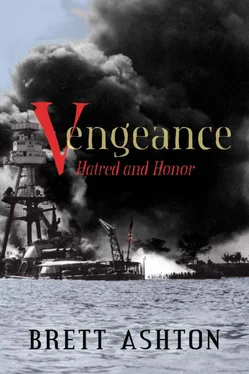I recognized the injured crewman as Chief Joe Fitzgerald, one of the men who worked in the mezzanine under turret three. His left foot was at a disturbingly odd angle, and he was obviously in a lot of pain. It was doubtful he could get off the ship on his own, let alone climb the increasingly slanted deck to the starboard side. There was just not enough time.
“ How are you doing, Joe? ” I shouted over the din of the attack while still trying to keep him calm.
“ I’ve had better days, sir! ” he shouted with a small bit of a smile. “ But I do need some help! ”
“ I see that! Don’t worry we’ll get you out of here! Can you swim? ” I asked him.
“ Looks like I’m gonna have to! ”
“ Alright then, put your left arm around my shoulder ,” I said as I helped him up. “ We have to get away from this torpedo hole. ”
I was just beginning to wonder how, or if, we were both going to be able to move on the slippery and increasingly slanted deck when the Japs, unfortunately, solved the problem for me.
It seemed almost like slow motion as I watched a Zero dive into a strafing run straight toward us. I could hear the distinctive sound of a pair of twenty-millimeter cannons opening fire and each one of probably several hundred rounds struck the ship with a sound like hundreds of sledge hammers on metal. I felt the chief yanked out of my arm. Not like he was pulling himself away from me, but like he was actually knocked away. The force of it spun me around, and I fell to the deck.
Regaining my bearings, I looked around for the chief, finding him lying up against the number three turret. Nothing could have prepared me for what I saw. It’s absolutely gruesome what a twenty-millimeter round does to the human body. The upper right side of his body was completely blown off. His right arm was gone. Liver, rib bones, parts of lung remaining, heart twitching. His head was lying over to one side, obviously no longer supported by a spinal column. Chunks of meat, blood, and bones were splattered everywhere on the deck and running down the side of the turret as well as all over me.
The absolute horror was indescribable; surreal, really. The image of Chief Fitzgerald’s mangled body lying there in the warm bright Hawaiian sunlight is something that may never go away in my mind. The full weight of the cruel brutality of modern warfare came crashing down on me all at once as I stared at it. I lay there frozen for a period of time that was most likely only a second or two, but felt like time immeasurable. Minutes, hours, days, or weeks, and anything that could happen in them became meaningless to me.
I suppose it is what is meant when someone says their life flashed before their eyes. But now I knew the reason why. I had reached my limit and was looking for someplace else to go. I saw the academy where I graduated, my parents, brothers and sisters playing in the snow, as well as friends from high school, all far, far away. My girlfriend Susie and I were walking hand in hand in the park when I asked her to marry me.
And then my thoughts strayed to another time and place, many long ages ago, it seemed, yet little more than a day gone by, when I was holding my newborn son, looking at his innocent little sleeping face as his head rested on my forearm.
I was drawn back just as Chief Fitzgerald’s body began to slide on the oily tipping deck, leaving a large streak of blood behind it as it went. It only stopped when it hit and got hung up on one of the poles for the lifelines. His left hand dangled past the pole over the side of the ship and touched the water, which was then about six inches below the aft main deck, as if to point out to me and say, “Sir, it’s time to go.” Then necessity drew my attention back to the increasing urgency of my situation. I had to get out of there, now .
I drew myself back to my feet and calmly took one last look around at my ship. I looked at her turrets, her anti-aircraft guns, then the gunnery towers and masts, which were looming sharply over me. I stood on the deck, which was tipped over at an angle too far to even guess. It was impossible to even think of climbing back up to the starboard side, which several other crewmen were still attempting. At that point I knew there was nothing else I could do except say goodbye to the Okie .
I climbed down the port side aft to where the ship really began to narrow. I could tell no torpedoes had struck here because the teak wood on the deck, which now had water climbing over the edge of it, was still intact. I stepped into the water, over the lifeline and then off of the ship into Pearl Harbor.
The Oklahoma was going to roll, and nothing on earth was going to change that. But I still had to get out of the way, so I began swimming as fast as I could to get clear of the ship and the crane, which was now towering above me.
I swam for my life, all the while thinking of nothing but wanting to see my wife and children again and holding them in my arms.
I’d guess about a minute and a half later, two more Kates dove down from across the harbor and began to make their run. They dropped their payload very low, very close to the water, then began to pull back to avoid colliding with the ship they were attacking. I wondered if I was far enough away to avoid being killed by the pressure of the blasts and began to swim even faster.
Fortunately the torpedoes were heading toward the forward part of the ship, but there was still a good chance this was going to hurt. The ship was rolled over far enough that the torpedoes were going to hit well above the normal waterline as well as any of the ship’s torpedo armor or blisters.
Boom! Boom! The eighth and ninth torpedoes struck the ship only seconds apart. Fortunately, by then, I was a safe distance from the ship.
“Damn, that’s going to be a bad one,” I said to myself, thinking about how the flooding water would be pouring into the ship from high above the lower decks. In my mind, any chance the Okie had of remaining upright ended at that point.
There were several Zeros running the length of Battleship Row with their guns blazing strafing anything that moved in or out of the water. “Animals,” I thought. “What kind of cowards shoot at defenseless people in the water?”
Remembering from the sting of the salt water that I was wounded, I decided I needed some sort of flotation device. There had not been any time before leaving the ship. And I had actually hoped to be on the starboard side so I could climb over as she rolled, so the thought came too late anyway.
Not knowing how long I was going to be in the water, and remembering my survival training, I quickly removed my shoes and tied them to a belt loop. Then I removed my pants and tied the ankles into individual knots. I held them leg-up and waist-down in the water, splashing until the wet legs filled with air and slipped them under my arms. These would hold me for about twenty minutes at a time, if I remembered the survival instructor correctly.
I could both hear, and physically feel in the water around me, the vibrations of the last painful screams of the Oklahoma , when the pressure on the structure of the ship increased as she flooded. The mangled plates of the hull, loosened by the torpedoes, were scraping and bending against each other. Groans from the dying ship filled both the air and the water.
I could actually feel the damaged port side being crushed on the bottom of the harbor as the weight of the ship rolled over on it. And with the weight of the masts, superstructure, and guns, along with the water now flooding in through the open hatches and torpedo holes on the port side, her center of balance far past the point of no return, she began to roll on the harbor floor toward me.
Читать дальше












